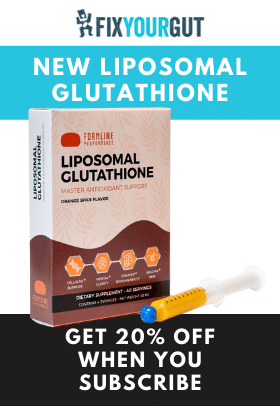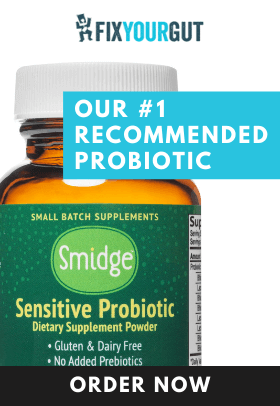When you think of serotonin, you imagine mood, happiness, depression, and antidepressants. Paxil, Prozac, Zoloft, and Celexa to name a few. Some people would argue that the United States truly is a Prozac nation. We sure do love our antidepressants; the amount of Americans that are on SSRI medications increases every year. 1
Here at Fix Your Gut, we have written a lot about how our gut affects our mental health. Serotonin is more than just a neurotransmitter, like melatonin, it is produced in large amounts by our gut bacteria and aids our digestion.
What is Serotonin and Why Is It Important?
Serotonin is a neurotransmitter that is derived from the amino acid tryptophan. Our gastrointestinal tract, muscles, blood, and central nervous system use the neurotransmitter. It is believed to be involved in regulating mood, appetite, and wakefulness. Our cells have different receptors for it (known as 5-HT receptors) and how it interacts with our cells and what it does for us depends on the type of receptor. 2 3 4
Serotonin regulation is why the antidepressant medications SSRI’s are so well known, they increase the amount of serotonin outside of our cells, decreasing reabsorption into the presynaptic cell of serotonin and prolonging its use by our body. The liver metabolizes the neurotransmitter. Monoamine oxidase metabolizes serotonin into an aldehyde, which, then is broken down by aldehyde dehydrogenase into 5-HIAA. Our kidneys process 5-HIAA and it is excreted in our urine. For proper serotonin regulation there needs to be a balance of serotonin in our blood plasma and the amount that are in our cells, neurons, and tissues. 5 6 7
What does serotonin do for us? 8 9 10 11
- It promotes wakefulness, helping to regulate our circadian rhythm. When serotonin release is elevated, melatonin decreases, keeping us awake.
- It regulates bone mass and growth.
- Proper serotonin regulation is essential for heart health. Serotonin helps to initiate proper blood clotting and decreases blood pressure as a vasodilator by increasing nitric oxide (NOS). It also has a vasoconstrictor effect which increases blood pressure (platelet aggregating).
- It reduces body temperature through vasodilation.
- It induces bronchoconstriction.
- It induces uterine contractions.
- It helps to regulate proper bone growth and repair regulation.
- It contributes to mood stabilization, in combination with other neurotransmitters.
- It helps to regulate our libido.
What Does Serotonin Have to do With Our Gut?
When most people think of serotonin, they think of it only as a neurotransmitter our brain produces, but the microbiome and the enterochromaffin cells in our gut produce 80% – 95% of the total serotonin concentration within the body. We have receptors within our digestive tract that react to it in different ways. The neurotransmitter is released through vagal stimulation and helps to control many important parts of our digestive system. So what does it do for our digestion? 12 13
Serotonin causes nausea and emesis. When a flood of increased serotonin reacts with the 5-HT3 receptors of the vagus nerve, nausea occurs by activating the vomiting center in the medulla oblongata. A flood of the neurotransmitter by the cells in our gut or gut bacteria can occur from ingestion of toxins, irritants, inflammation, intake of probiotics, prebiotics, and antimicrobial agents. 14 15 16 17
Serotonin is very crucial for the MMC. It helps with proper muscle contractions of the digestive system aiding in peristalsis. Too much of it, however, can lead to diarrhea, where too little causes constipation. 18 19 20
It also limits appetite by halting dopamine release. The neurotransmitter helps give us a sense of satiety and increases while we consume food. 20 22 23
Your esophagus also contains serotonin receptors which help with esophageal contractions and UES and LES relaxation. Increased serotonin may cause the LES and UES to relax too often, which can contribute to reflux. For proper digestion and tone, serotonin is needed. SSRI’s are used to help treat esophageal motility disorders were peristalsis lessens or where the LES fails to relax properly for digestion. 24 25 26
Serotonin is one of the many endogenous chemicals that regulate gallbladder contractions to release bile into the duodenum for digestion. Dumping syndrome will occur if too much of the neurotransmitter is concentrated. If too little bile is released, toxin metabolism reduces, overgrowth occurs, and so does lipid maldigestion. 27
Proper regulation of serotonin is important for liver health. 28 29
It regulates stomach and intestinal mucin secretion. Serotonin production is important in preventing leaky gut. 30
It can inhibit stomach acid production. Therefore proper concentrations are necessary for digestion. 31
Our probiotic microbiome helps produce the neurotransmitter for us to aid in digestion. A good amount of our probiotic microbiome in our appendix produces serotonin and melatonin. People suffering from appendicitis, overgrowth, and inflammation, generally have low amounts of serotonin. The correlation between constipation and appendicitis is fascinating. Could it be from the lack of serotonin production in the gut from opportunistic overgrowth? 32 33 34
People with methane dominant archaea have lower amounts of serotonin production in the gut because the archaea reduce the probiotic bacteria that help to produce serotonin in the gut leading to chronic constipation. People that are suffering from hydrogen dominant bacterial overgrowth, however, may have too much of the hormone in the gut, causing rapid motility and diarrhea. 35 36
Medical literature and studies have shown us that when certain areas of the digestive system have fewer amounts of serotonin produced because of overgrowth or structural issues, digestion suffers as a whole. Motility slows, maldigestion occurs, stomach acid production issues occur, sphincters relax improperly, and bile is not regulated properly. Without proper serotonin levels in the gut, digestion suffers!
How Do We Naturally Regulate Serotonin Levels For Better Overall Health?
I do not agree with the use of antidepressant medications to treat neurotransmitter regulation issues for most people. Different drugs have different side effects, and most antidepressants cause more harm than help for most people. So what can someone do to help keep their serotonin levels normal if they are having symptoms of low serotonin, affecting their gut health?
How to make sure your serotonin levels are healthy:
Maintaining proper circadian rhythm is also necessary for proper serotonin production. Making sure you get proper sunlight exposure is crucial for the regulation of serotonin.
Thyroid health is also important for proper serotonin regulation. 37 38 39
Proper hormone balancing is important for serotonin regulation. Issues with estrogen, progesterone, and testosterone homeostasis cause issues with it. 40 41
One of the most important steps people can do to improve serotonin production is to make sure their probiotic microbiome is healthy. Eating a healthy clean diet like the Perfect Health Diet will help feed the probiotic microbiome and keep it happy so that it produces proper amounts of serotonin. Periodic ingestion of foods that contain prebiotics (cruciferous vegetables and black beans) and fermented foods can also help to maintain an in-tune microbiome. 42
Liver health is important in the conversion and breakdown of the neurotransmitter. 43
Ingesting enough of the amino acid L-tryptophan in the diet is important for serotonin production. Meat, sesame seeds, sunflower seeds, and cheese are very high in L-tryptophan. 44
Magnesium is important in regulating proper serotonin levels in the body. 45
Vitamin B-1 (thiamine), B-3 (niacin), B-6 (pyridoxine), B-9 (folate), and B-12 are important in the synthesis of serotonin. Make sure you are getting enough in your diet to help or supplement if needed. Some B vitamins affect methylation (B-9, methylated B-12): do not supplement with these B vitamins without knowing your methylation status and use them with caution. 46 47 48 49
The minerals calcium and selenium are also important for proper serotonin production. 50 51 52 53
MAO-A (monoamine oxidase a) is an enzyme that breaks down serotonin. 54
Proper intake and regulation of vitamin D and omega 3 fatty acids are essential for serotonin regulation. 55
Exercise frequency is important for regulation. 56
I do not recommend supplements to increase serotonin; the above steps should fix most regulation issues. That being said, some people use supplements to modulate serotonin including L-tryptophan, 5-HTP, SAM-e, and St. John’s Wort (works more like a SSRI than the others). Do not use these supplements without knowing their methylation status and use them with caution. Supplements and medication to modulate the 5-HT3 serotonin receptor and improve nausea are safer and seem to be tolerated better if need, they include:
- Ginger – I recommend either taking New Chapter Ginger Force, twice daily with meals, drinking ginger tea twice daily with meals, or eating fresh grated ginger twice daily with meals. Ginger contains galanolactone that appears to be a potent 5-HT3 antagonist that might explain its anti-emetic properties and ability to accelerate gastric emptying. 57
- Vitamin B-6 (pyridoxine) 58
- Zofran – Ondansetron is a serotonin 5-HT3 receptor drug used in the prevention of nausea and vomiting. It works by reducing the activity of the vagus nerve, which deactivates the vomiting center in the medulla oblongata. In addition, in people with IBS, it has been shown to reduce colonic contractions and motility. Ondansetron is a well-tolerated drug with few systemic side effects. The most common side effects are constipation, dizziness, and headaches. Ondansetron has recently been discovered to cause long QT syndrome and heart arrhythmias in high doses (greater than 30 mg). Zofran works well in people with SIBO-D but may cause constipation to worsen in people with SIBO-C. 59
Proper production of serotonin is more than just mental health, it is important to our whole being. The majority of neurotransmitter production occurs in our gut, and we are learning more about how gut health affects our mental health. Maybe in the future, we will obtain a greater understanding of the neurotrasnitter and how the gut microbiome plays an important role in its regulation.
There are several endogenous chemicals which affect digestion including:
- Serotonin
- CCK
- GIP
- Gastrin
- Secretin
- Motilin
- Dopamine
- Acetylcholine
- Gaba
- Ghrelin
- Leptin
- Histamine
- Melatonin
- http://www.nbcnews.com/health/health-news/one-6-americans-take-antidepressants-other-psychiatric-drugs-n695141 ↩
- Perlmutter, David, Brain Maker, Little, Brown and Company, 2015. ↩
- Beers, Mark. The Merck Manual, Merck Research Laboratories, 2006. ↩
- Lee, James. Better Living Through Neurochemistry, Amazon Digital Services LLC ↩
- Perlmutter, David, Brain Maker, Little, Brown and Company, 2015. ↩
- Beers, Mark. The Merck Manual, Merck Research Laboratories, 2006. ↩
- Lee, James. Better Living Through Neurochemistry, Amazon Digital Services LLC ↩
- Perlmutter, David, Brain Maker, Little, Brown and Company, 2015. ↩
- Beers, Mark. The Merck Manual, Merck Research Laboratories, 2006. ↩
- Lee, James. Better Living Through Neurochemistry, Amazon Digital Services LLC ↩
- Brady, Siegel, Albers, Price. Basic Neurochemistry, Academic Press; 8th edition, 2011 ↩
- Perlmutter, David, Brain Maker, Little, Brown and Company, 2015. ↩
- Lee, James. Better Living Through Neurochemistry, Amazon Digital Services LLC ↩
- https://www.ncbi.nlm.nih.gov/pubmed/10490049 ↩
- https://www.ncbi.nlm.nih.gov/pubmed/8974084 ↩
- https://www.ncbi.nlm.nih.gov/pubmed/8520873 ↩
- http://link.springer.com/article/10.2165/00023210-199708050-00005 ↩
- https://www.ncbi.nlm.nih.gov/pubmed/24662475 ↩
- https://www.ncbi.nlm.nih.gov/pubmed/6238158 ↩
- http://journal.frontiersin.org/article/10.3389/fnins.2012.00016/full ↩
- http://journal.frontiersin.org/article/10.3389/fnins.2012.00016/full ↩
- Perlmutter, David, Brain Maker, Little, Brown and Company, 2015. ↩
- Lee, James. Better Living Through Neurochemistry, Amazon Digital Services LLC ↩
- http://journal.frontiersin.org/article/10.3389/fnins.2012.00016/full ↩
- https://www.ncbi.nlm.nih.gov/pmc/articles/PMC4247306/ ↩
- https://www.ncbi.nlm.nih.gov/pubmed/21532161 ↩
- https://www.ncbi.nlm.nih.gov/pubmed/20685881 ↩
- https://www.ncbi.nlm.nih.gov/pubmed/18280000 ↩
- https://www.ncbi.nlm.nih.gov/pubmed/22119013 ↩
- https://www.ncbi.nlm.nih.gov/pmc/articles/PMC3272651/ ↩
- https://www.ncbi.nlm.nih.gov/pmc/articles/PMC3272651/ ↩
- https://www.ncbi.nlm.nih.gov/pmc/articles/PMC3272651/ ↩
- https://www.ncbi.nlm.nih.gov/pubmed/19132991 ↩
- https://www.ncbi.nlm.nih.gov/pmc/articles/PMC2694720/ ↩
- https://www.ncbi.nlm.nih.gov/pmc/articles/PMC3895606/ ↩
- https://chriskresser.com/sibo-and-methane-whats-the-connection/ ↩
- http://www.scielo.br/scielo.php?script=sci_arttext&pid=S1983-32882010000200011 ↩
- http://www.jcircadianrhythms.com/articles/10.1186/1740-3391-4-12/ ↩
- https://www.ncbi.nlm.nih.gov/pubmed/10219711 ↩
- Brady, Siegel, Albers, Price. Basic Neurochemistry, Academic Press; 8th edition, 2011 ↩
- http://www.mdmag.com/medical-news/testosterone-supplementation-may-increase-serotonin-levels-in-the-brain ↩
- Perlmutter, David, Brain Maker, Little, Brown and Company, 2015. ↩
- Brady, Siegel, Albers, Price. Basic Neurochemistry, Academic Press; 8th edition, 2011 ↩
- Brady, Siegel, Albers, Price. Basic Neurochemistry, Academic Press; 8th edition, 2011 ↩
- http://bodyecology.com/articles/boost_serotonin_happiness_heals_brain.php ↩
- Perlmutter, David, Brain Maker, Little, Brown and Company, 2015. ↩
- Beers, Mark. The Merck Manual, Merck Research Laboratories, 2006. ↩
- Lee, James. Better Living Through Neurochemistry, Amazon Digital Services LLC ↩
- Brady, Siegel, Albers, Price. Basic Neurochemistry, Academic Press; 8th edition, 2011 ↩
- Perlmutter, David, Brain Maker, Little, Brown and Company, 2015. ↩
- Beers, Mark. The Merck Manual, Merck Research Laboratories, 2006. ↩
- Lee, James. Better Living Through Neurochemistry, Amazon Digital Services LLC ↩
- Brady, Siegel, Albers, Price. Basic Neurochemistry, Academic Press; 8th edition, 2011 ↩
- Brady, Siegel, Albers, Price. Basic Neurochemistry, Academic Press; 8th edition, 2011 ↩
- Perlmutter, David, Brain Maker, Little, Brown and Company, 2015. ↩
- Perlmutter, David, Brain Maker, Little, Brown and Company, 2015. ↩
- https://www.ncbi.nlm.nih.gov/pubmed/23490018 ↩
- Perlmutter, David, Brain Maker, Little, Brown and Company, 2015. ↩
- Beers, Mark. The Merck Manual, Merck Research Laboratories, 2006. ↩







How does one test for serotonin levels? I have been through most recommended tests and various supplementation via a Naturopath who pretty much follows your protocols in “Fix Your gut”. I have no SIBO, but have had daily afternoon nausea, as well as reflux and constipation (controlled with magnesium) for six years. These have lessened but not disappeared. It’s the nausea that’s most disturbing to me. Your article on serotonin leads me to wondering about serotonin levels and how to find out if they are high or low. The nausea leads me to believe it is low.